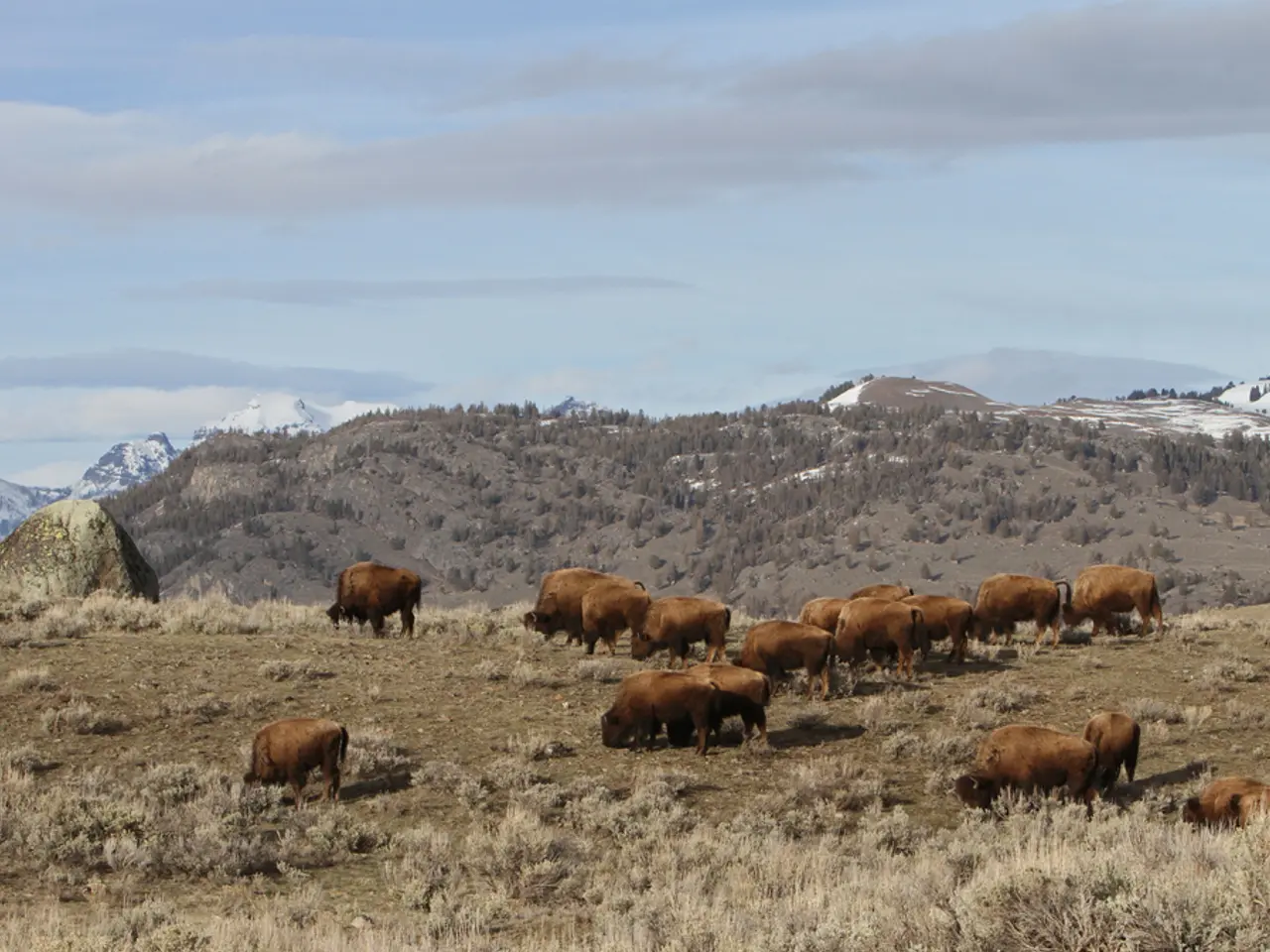A plant-based diet comprises about three-quarters less environmental impact compared to a diet rich in meat.
In a groundbreaking study published in Nature Food, researchers from the University of Oxford have highlighted that a vegan diet significantly reduces environmental impacts compared to a high-meat diet. The study, involving 55,000 people's dietary data, factored in how and where food is produced to determine its environmental impact.
The study found that a vegan diet reduces greenhouse gas emissions, water use, land use, water pollution, and biodiversity destruction by approximately 75%, 54%, 76%, 46%, and 66% respectively [1][2].
Key environmental benefits outlined include:
- Greenhouse Gas Emissions Reduction: The vegan diet substantially lowers methane and nitrous oxide emissions, largely produced by livestock. Livestock accounts for a significant portion of agricultural emissions (approximately 25% in the US), with methane being a potent contributor to climate change [1][2].
- Land Use Efficiency: Plant-based diets require far less land compared to meat-heavy diets. The global adoption of plant-based eating can reduce agricultural land use by about 76%, freeing billions of hectares for re-wilding and carbon sequestration [2].
- Water Conservation: Vegan diets use considerably less freshwater because raising animals demands high water inputs for feed and hydration, whereas plants generally require less water for production [2].
- Biodiversity Protection: By reducing the need for intensive animal agriculture, vegan diets reduce habitat destruction and help preserve wildlife, as animal farming drives deforestation and ecosystem degradation [2].
Michael Clark, a researcher at the University of Oxford, and Dr. Keren Papier, a Senior Nutritional Epidemiologist at the same institution, were part of the team behind this comprehensive study. The research linked participants' diets to five key environmental measures: greenhouse gas emissions, land use, water use, water pollution, and biodiversity loss.
Participants reported their dietary habits for 12 months and were classified into six groups: vegan, vegetarian, fish-eaters, and low-, medium-, and high-meat-eaters. Compared to high meat-eaters, vegans had 25% less impact for land use, 46% less for water use, 27% less for water pollution, and 34% less for biodiversity. Even low meat diets had about 70% of the impact across most environmental measures of high meat diets [1].
The findings echo the recommendations of the National Food Strategy and the UK's Climate Change Committee, which suggest an additional 30%-35% reduction in meat consumption [3]. This article was originally published on The Conversation.
It's important to note that even the least sustainable vegan diet was more environmentally-friendly than the most sustainable meat eater's diet, according to the study. In the UK, meat eating declined over the decade to 2018, but additional reductions are necessary to meet environmental targets. The food system is estimated to be responsible for around 30% of global greenhouse gas emissions, 70% of the world's freshwater use, and 78% of freshwater pollution [4].
As we strive to combat climate change and protect our planet, the choices we make about what we eat can play a significant role. While personal choices can be difficult to change, evidence suggests that a transition towards more plant-based diets could significantly reduce the environmental impact of the food system.
References: 1. Clark, M., Keane, E., Kovacs, B., & Papier, K. (2021). Dietary shifts towards plant-based eating improve health and environmental sustainability. Nature Food, 2, 652–664. https://doi.org/10.1038/s43016-021-00300-2 2. Clark, M., Keane, E., Kovacs, B., & Papier, K. (2021). Dietary shifts towards plant-based eating improve health and environmental sustainability. Nature Food, 2, 652–664. https://doi.org/10.1038/s43016-021-00300-2 3. National Food Strategy. (2021). National Food Strategy: Our Plan for Healthier, Happier People and a Greener Planet. https://www.nationalfoodstrategy.org/ 4. Intergovernmental Panel on Climate Change. (2019). Climate Change and Land: An IPCC Special Report on Climate Change, Desertification, Land Degradation, Sustainable Land Management, Food Security, and Greenhouse Gas Fluxes in Terrestrial Ecosystems. https://www.ipcc.ch/report/srccl/
- The study in Nature Food, led by researchers from the University of Oxford, has demonstrated that adopting a vegan diet could potentially reduce greenhouse gas emissions, water use, land use, water pollution, and biodiversity destruction by approximately 75%, 54%, 76%, 46%, and 66% respectively.
- The decision to follow a more plant-based diet can have significant environmental benefits, as highlighted by the study, such as reduced habitat destruction and preservation of wildlife due to decreased demand for intensive animal agriculture.
- The research from the University of Oxford has further emphasized the role of nutrition in health-and-wellness and environmental-science, as the choices we make about our diets can substantially impact the food system's environmental footprint, particularly regarding climate change.




